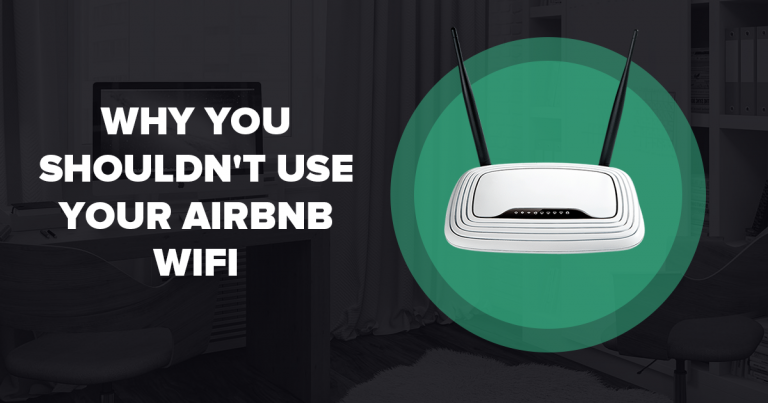
Why You Shouldn’t Use Your Airbnb WiFi
For those who travel often, Airbnb is a fantastic website for booking accommodations. Not only do you get a decent price (read: cheaper than a hotel), but you also have a greater chance to experience the culture and people. One of the essential amenities at almost every Airbnb nowadays is WiFi. Within minutes of arriving, guests are given the WiFi password, and while there’s nothing wrong with that, using that WiFi could be dangerous.
Whether you’re the visitor or the host, your information and accounts can easily be hacked. Ahead, we show you how to protect yourself while hosting or while traveling.
Wi-Fi Security is a Matter of Great Concern
Did you ever wonder who was sharing your Wi-Fi connection when you were on holiday? We’re not implying that Airbnb hosts are a community of hackers, but the Wi-Fi passwords of such accommodations are usually passed on to a large number of people, and the passwords are not frequently changed.
You might be connected to a hacked network from a previous visitor, or the owner might be sharing his or her network, making the WiFi even less secure.
Since many hosts often share the same WiFi network with their guests, they are also putting themselves at risk. (Here are 10 more reasons why you should stop using public WiFi).
Hacking an Airbnb Network is Very Simple
While most WiFi networks are encrypted, they are still very simple to hack.
All home routers can be controlled by a browser, and anyone with a little technical expertise can quickly find the assigned IP address. If you enter the IP address of the router in the address bar of a browser, you can quickly find the default login details and gain control of the router and the network.
That’s not all. Once you access the router, you can also access and change the gateway. For example, you could set up a Raspberry Pi in such a way that all network traffic was routed through your device.
If you have your own DNS server on this device, you can create pages that look very similar to Gmail or Facebook. Once you do that, it’s very simple to convince whoever is on the network to enter their login details. They would never know the difference, but you would now have all the information you need to steal their identity.
Although this is an exaggerated scenario, it can still happen. It is very simple for any Airbnb visitor to hide a device that would continue to collect password and login information until the device is discovered or the WiFi password changes.
Sharing a Network Shares Other Things, Too
Even without hacking, anyone logged in to the same network can see things you have shared, like holiday photos, spreadsheets, documents, PDFs, music, and videos.
Although it’s convenient (and usually harmless) to share your calendar with everyone on your network – especially if you’re a host and it’s your home network – if any Airbnb visitors log into that network, they can see it, too.
If setting up a separate network for your visitors is not feasible, it is crucial to take precautions and ensure there is no sensitive information you'd rather keep private that may be visible to them.
VPN Protection for Travelers
If you visit Airbnb’s often and use open networks or Wi-Fi connections, a VPN (Virtual Private Network) is necessary. A VPN encrypts your data and provides a level of security that protects you from anyone else on the same network. It is nearly impossible to hack, and it’s a must-have if you want to protect your online data and information.
Many VPNs allow you to use more than one device at a time, so you don’t have to worry if you bring your phone and laptop on your travels. Or, if at home, you need a few people to use the same VPN at once.
VPNs include some great security features, like a kill-switch, that can immediately disconnect your device if the connection is interrupted for any reason. VPNs have some other nifty features as well, like accessing geoblocked content, allowing simultaneous device connections, and including server locations all around the world.
Not all VPNs include these features (and some even access your data), so it’s best to use a recommended VPN. Our best VPNs include top-of-the-line security features and have servers all over the world, so you connect wherever your travels take you.
Protecting Yourself as an Airbnb Host
As an Airbnb host, it’s also important to protect your online data. While Airbnb does have a screening process, as we explained above, it’s really easy for someone to hack your network and continue accessing it long after they're gone.
The best way to protect yourself is to have a separate WiFi network for your guests and to frequently change your password.
If you share your Wi-Fi network with guests, a VPN is a good investment. Not only will it give you access to all of Netflix’s content (win!), it will also encrypt your data, protecting you from any questionable guest you might have.
While you can’t always know who’s going to be at your Airbnb, you can ensure that your data and information remains safe from harm with a VPN.
To summarize, the best VPNs in 2023 are...
Your data is exposed to the websites you visit!
Your IP Address:
Your Location:
Your Internet Provider:
The information above can be used to track you, target you for ads, and monitor what you do online.
VPNs can help you hide this information from websites so that you are protected at all times. We recommend ExpressVPN — the #1 VPN out of over 350 providers we've tested. It has military-grade encryption and privacy features that will ensure your digital security, plus — it's currently offering 49% off.


